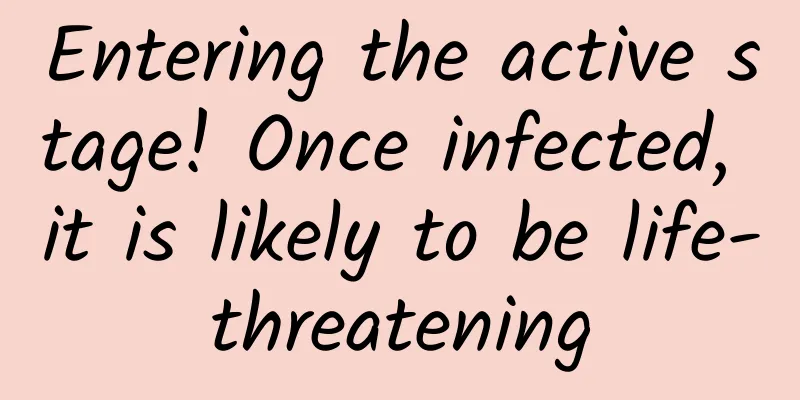Entering the active stage! Once infected, it is likely to be life-threatening

|
Mr. Gao's hometown is in the mountainous area of Anji County, Zhejiang Province. During the May Day holiday, he took his two children back to his hometown to experience the joy of playing in the mountains. Unexpectedly, this trip caused Mr. Gao to be infected with a serious rare disease, which almost endangered his life! 01 High fever and bruises after outdoor activities It turned out that he was infected with this rare disease When he returned home in the evening, Mr. Gao felt dizzy, as if he was drunk, and had no strength. Then he began to feel cold all over, and his forehead began to feel hot. His family took a thermometer and found that his temperature was 39 degrees Celsius! Mr. Gao thought he was tired from playing during the day, so he took anti-inflammatory and antipyretic drugs on his own. However, his body temperature did not drop, and he became even more listless. What’s even more frightening is that, as if overnight, Mr. Gao’s body was covered with red papules. They didn’t hurt or itch, but they became more and more numerous, covering a large area. His body temperature even soared to 40℃ at one point. After five days of recurrence, Mr. Gao became increasingly weak. His family realized that this might not be a common cold or fever, so they quickly took him to Hangzhou First People's Hospital. After receiving the diagnosis, Dr. Bu Zhangyu, deputy director of the Department of Dermatology, found that in addition to the red papules on the trunk, there were also bruises of varying sizes on the limbs. After completing various related examinations for him, it was found that the inflammatory indicators such as white blood cells, C-reactive protein, and procalcitonin were significantly abnormal, indicating that he was in a state of severe infection and that his organs were damaged to varying degrees. The bruises on his body were related to a significant decrease in platelets, and the initial diagnosis was sepsis. After learning that Mr. Gao had been out in the wild a few days ago, Bu Zhangyu inferred that it might be related to infection with insect-borne microorganisms. The DNA of Rickettsia japonicum was detected by blood metagenomic sequencing, which also verified Bu Zhangyu's judgment. Mr. Gao was diagnosed with Japanese spotted fever. 02 Mainly transmitted by insect vectors Once infected, it is likely to be life-threatening What is Japanese spotted fever? Bu Zhangyu introduced that Japanese spotted fever is a rickettsial disease caused by Rickettsia japonicum, characterized by high fever, rash and eschar formation. It was reported in Japan as early as 1984, with a mortality rate of about 60%. There are also cases reported in the southeastern coastal areas of my country, but it is still very rare overall. Japanese Rickettsia is mainly transmitted through organisms such as ticks, lice and mites. "Because ticks feed on animal blood, they often carry a variety of viruses from other animals in their bodies." Bu Zhangyu further explained, "If a tick carrying Japanese Rickettsia bites a person, the patient is likely to be infected." Infection with Rickettsia japonicum can cause complications such as pneumonia, meningoencephalitis, disseminated intravascular coagulation (DIC), multiple organ failure (MOF), and other life-threatening diseases, and many deaths have been reported. 03 The insects have entered their active phase These prevention keys cannot be relaxed The recent period is a good time for people to travel, and it is also a carnival time for "little bugs". If you are not careful, you may "accidentally fire". Moreover, these bugs are often small in size, and if they bite hidden parts, it is difficult for people to find them. Therefore, Bu Zhangyu reminds people to be vigilant when enjoying the beauty of nature: 1. When you are in the suburbs to escape the heat, you should avoid sitting or lying down in the jungle or bushes. 2. It is recommended to close the screen windows before going to bed to prevent wild flying insects from entering the room. 3. When going out for fun, it is best to wear long sleeves and long pants. When entering areas with dense vegetation, you need to roll up your sleeves to minimize skin exposure. 4. Prepare insect repellent and spray it on exposed areas before going out to reduce the risk of poisonous insects. 5. After returning home, you should change clothes and take a shower in time, paying special attention to hidden parts such as armpits, back, and neck. 6. If bitten by a poisonous insect, please seek medical attention immediately. Source: People's Daily Science FM93 Traffic Voice, Orange Interactive·Metropolitan Express |
>>: Popular Science | The Birth of Algebraic Topology
Recommend
Friends who want to buy Sagitar, please wait. The new generation of high-value 8AT Sagitar is coming.
When talking about FAW-Volkswagen's sedans, t...
Does Vinegar-Stir-fried Potato Shreds contain Slow-Digesting Starch? How to Eat Potatoes Without Surges in Blood Sugar?
Everyone knows that potatoes (scientific name Sol...
The "COVID-19 Oral Drug" is here! Virus, retreat! Retreat! Retreat!
On July 25, the National Medical Products Adminis...
Traditional advertising makes 400 phone calls?
Friends who work in advertising should all have a...
Abandoned Imagination decides to sell itself, China should take it into its pocket
Imagination, a well-known British chip manufacture...
Experience in operating knowledge accounts with millions of followers on Douyin
2021 is already half over. Where are the opportun...
A paralyzed patient was admitted to the anorectal surgery department? Be careful, constipation may also be life-threatening!
Recently, Ms. Li (pseudonym), a patient with lowe...
[Creative Cultivation Program] The "Growth History" of a Little Strawberry
When it comes to strawberries, everyone should be...
A brief discussion on the five steps of online operation and promotion
Operation promotion plays a very important role i...
“Health from eating” series | Packing rice in plastic bags not only causes food poisoning but also causes cancer?
Do you usually pack your meals in bags or lunch b...
Blender stylized character full process [good quality and materials]
Blender stylized character full process [good qua...
Will you avoid getting a suntan if you use a parasol? Buying the wrong one or using it incorrectly will ruin your sunscreen
Sunshade is an essential tool for many people to ...
Yiche.com: BYD occupies seven of the top ten domestic car sales in August 2024
Yiche.com compiled a sales ranking of domesticall...
3 material optimization and analysis methods for information flow advertising!
The impact of advertising materials on advertisin...









